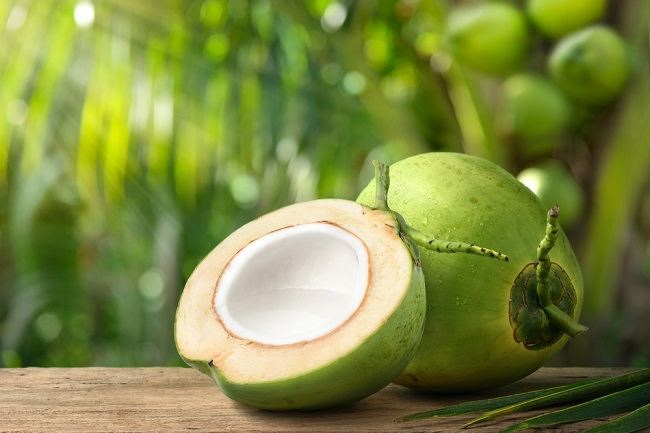Young coconuts, often referred to as “green coconuts,” are one of the tropical world’s most cherished gifts. With their naturally refreshing water and tender meat, they’re not just a treat for the senses but also a powerhouse of health benefits. Celebrated in culinary traditions and natural remedies across cultures, particularly in tropical regions like Indonesia, young coconuts hold a wealth of benefits that make them a favorite for many. Let’s dive into their origins, nutritional value, health benefits, culinary uses, and business potential.
Origins and Cultivation of Young Coconuts
Young coconuts come from the coconut tree (Cocos nucifera), a versatile member of the Arecaceae family. These trees thrive in tropical climates such as Southeast Asia, the Caribbean, and South America. Indonesia, being one of the largest coconut producers in the world, makes young coconuts a national agricultural treasure.
Young coconuts are harvested early in their growth cycle, typically when the meat is soft and the water is at its peak freshness. Timing is crucial, as young coconuts contain more water and have a sweeter taste compared to mature coconuts. Farmers often practice environmentally friendly cultivation techniques to ensure the highest quality coconuts, nurturing the trees with adequate nutrients in fertile soil.
Nutritional Content of Young Coconuts
Young coconuts are celebrated as a natural source of hydration and nutrition. The coconut water is packed with essential electrolytes like potassium, sodium, and magnesium, which are crucial for maintaining body fluid balance. Additionally, the tender coconut meat contains fiber, protein, and healthy fats, which are beneficial for digestion and heart health.
Here’s a breakdown of key nutrients found in young coconuts:
- Potassium: Supports muscle and nerve functions.
- Magnesium: Promotes bone health and energy metabolism.
- Sodium: Aids in maintaining electrolyte balance.
- Vitamin C: Boosts the immune system.
- Lauric Acid: Offers antimicrobial properties that help protect the body from infections.
Moreover, young coconuts are low in calories, making them an excellent choice for those looking to maintain a healthy weight. Coconut water is often used as a natural rehydration drink after exercise, thanks to its electrolyte composition that closely mirrors human body fluids.

Health Benefits of Young Coconuts
Consuming young coconuts offers a myriad of health benefits, including:
- Optimal Hydration: With its natural electrolyte content, coconut water is an ideal drink to replenish lost fluids after physical activity or exposure to heat.
- Heart Health: The potassium in young coconuts helps lower blood pressure and supports cardiovascular health.
- Detoxification: Coconut water has natural diuretic properties that assist in flushing toxins out of the body.
- Immune Support: Lauric acid’s antimicrobial properties protect against harmful bacteria and viruses.
- Digestive Aid: The fiber in young coconut meat promotes healthy digestion and prevents constipation.
- Energy Boost: With its natural sugars, coconut water provides instant energy without added artificial sweeteners.
Culinary Uses of Young Coconuts
Young coconuts are not just refreshing beverages; they also hold a valuable place in culinary creations. In Indonesia, they are popularly enjoyed as es kelapa muda (young coconut ice), a staple in tropical refreshments. They also feature in desserts, soups, and innovative culinary experiments. Here are a few creative ways to use young coconuts in the kitchen:
- Refreshing Drinks: Combine coconut water with lime, honey, or tropical fruits for a revitalizing beverage.
- Coconut Pudding: The soft coconut meat makes an excellent base for puddings or jellies.
- Smoothies: Blend coconut water and meat into your favorite smoothies for added flavor and nutrition.
- Tropical Soups: Add chopped coconut meat to coconut-milk-based soups for a unique texture.
- Decadent Desserts: Pair young coconut with chocolate, mango, or durian for mouthwatering desserts.
Business Potential of Young Coconuts
As one of the most versatile agricultural products, young coconuts present significant business opportunities both locally and internationally. With the global trend toward healthy living and natural products, the demand for young coconuts continues to rise.
Here are some business prospects associated with young coconuts:
- Export Market: Countries like the United States, the UAE, and Europe have a high demand for fresh young coconuts.
- Processed Products: Packaged coconut water, coconut-based desserts, and ready-to-drink coconut beverages are high-value products that cater to health-conscious consumers.
- Tourism Industry: Resorts and restaurants in tropical destinations often feature young coconuts as part of their premium menus.
- Beauty Products: Coconut water is also used in skincare products for its moisturizing and soothing properties.
Young Coconuts and Sustainability
Beyond their economic benefits, young coconuts contribute to environmental sustainability. The coconut tree is a “tree of life,” with virtually every part of the plant being utilized—from the fruit and leaves to the trunk. Using young coconuts as an alternative to plastic-packaged drinks can also reduce plastic waste, especially when coconuts are presented in their natural shells.
To ensure sustainability, it’s essential for producers to adopt responsible farming practices, such as crop rotation and organic fertilizers. This way, young coconuts not only benefit human health but also support the health of our planet.
Young coconuts are a remarkable gift from nature, combining refreshing taste, exceptional health benefits, and substantial economic value. Whether you enjoy them as a natural beverage, incorporate them into culinary masterpieces, or explore their potential in business, young coconuts offer something for everyone. In a fast-paced modern world, they serve as a simple reminder that sometimes the best solutions come directly from nature.
So, have you had your young coconut today?
